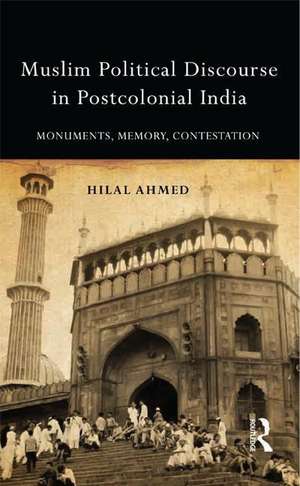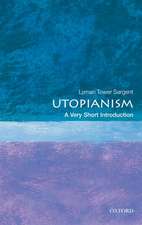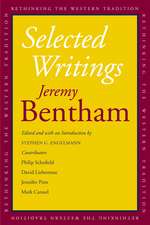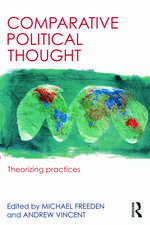Muslim Political Discourse in Postcolonial India: Monuments, Memory, Contestation
Autor Hilal Ahmeden Limba Engleză Hardback – 8 aug 2014
Raising critical questions such as whether Muslim responses to political questions are homogenous, the book will greatly interest researchers and students of political science, modern Indian history, sociology, as well as the general reader interested in contemporary India.
| Toate formatele și edițiile | Preț | Express |
|---|---|---|
| Paperback (1) | 397.12 lei 6-8 săpt. | |
| Taylor & Francis – 25 apr 2019 | 397.12 lei 6-8 săpt. | |
| Hardback (1) | 1165.20 lei 6-8 săpt. | |
| Taylor & Francis – 8 aug 2014 | 1165.20 lei 6-8 săpt. |
Preț: 1165.20 lei
Preț vechi: 1420.98 lei
-18% Nou
Puncte Express: 1748
Preț estimativ în valută:
222.98€ • 231.39$ • 186.38£
222.98€ • 231.39$ • 186.38£
Carte tipărită la comandă
Livrare economică 17-31 martie
Preluare comenzi: 021 569.72.76
Specificații
ISBN-13: 9781138020160
ISBN-10: 1138020168
Pagini: 344
Dimensiuni: 138 x 216 x 28 mm
Greutate: 0.5 kg
Ediția:1
Editura: Taylor & Francis
Colecția Routledge India
Locul publicării:Oxford, United Kingdom
ISBN-10: 1138020168
Pagini: 344
Dimensiuni: 138 x 216 x 28 mm
Greutate: 0.5 kg
Ediția:1
Editura: Taylor & Francis
Colecția Routledge India
Locul publicării:Oxford, United Kingdom
Public țintă
PostgraduateCuprins
Preface. Acknowledgements. 1. Introduction 2. Monumentalisation in Colonial India: Discovery of an ‘Indian Muslim Architectural Heritage’ 3. Monumentalisation in Postcolonial India: Conservation, Law and Muslim Politics 4. Jama Masjid and the Political Memory of a Royal Muslim Past 5. Babri Masjid and the Muslim Politics of Right to Heritage 6. Conclusion. Appendices. Select Bibliography. About the Author. Index
Recenzii
‘Hilal Ahmed’s book is a pioneering exploration of the politics of historical monuments, an interdisciplinary work linking the analysis of law, history and politics. It offers a remarkable analysis of the ways in which reinterpreted images of the past work as resources for mobilization and action in the political present. The book also offers a fascinating analysis of the politics around the Jama Masjid in Delhi – showing how religious monuments transform into sites of the political public sphere. Ahmed provides an insightful examination of the construction of historical memory and a sophisticated exploration of the complex effects of democratic mobilization on the political identity of Indian Muslims.’—Sudipta Kaviraj, Professor of Indian Politics and Intellectual History, Middle Eastern, South Asian and African Studies, Columbia University, New York
‘What could be more concrete, more singular in meaning than a building? In fact, many different actors have made signage, use, disputation, and rituals have made India’s built past centrally important in defining nationalism and belonging. Citizens absorb the assumptions of national identities as wholly natural, and the historical meanings attached to sites and buildings are part of those identities. Hilal Ahmed’s book provides a fresh and original analysis to understanding cultural and political life in India’s culturally plural society today.’—Barbara Metcalf, Professor of History Emerita, University of California, Davis
‘Hilal Ahmed analyses the way in which political groups, both Hindu and Muslim, have used the great monuments of the Indo-Islamic tradition for political mobilisation. His book is one of the most important and innovative pieces of research of recent times. No scholar in the field should ignore it.’—Francis Robinson, Professor of the History of South Asia, Royal Holloway, University of London
'Ahmed's study is exceptionally successful in placing Indian Muslim political discourses into the wider context of postcolonial socio-political processes without having to compromise with the internal dynamics of the community" - Jahfar Shareef, Centre for the Study of Social Systems, Jawaharlal Nehru University, New Delhi (South Asia Research)
"A highly significant contribution to a comprehensive understanding of the political significance of India’s Islamic architecture." - Santhi Kavuri-Bauer, South Asia: Journal of South Asian Studies Vol. 39, 301-302
‘What could be more concrete, more singular in meaning than a building? In fact, many different actors have made signage, use, disputation, and rituals have made India’s built past centrally important in defining nationalism and belonging. Citizens absorb the assumptions of national identities as wholly natural, and the historical meanings attached to sites and buildings are part of those identities. Hilal Ahmed’s book provides a fresh and original analysis to understanding cultural and political life in India’s culturally plural society today.’—Barbara Metcalf, Professor of History Emerita, University of California, Davis
‘Hilal Ahmed analyses the way in which political groups, both Hindu and Muslim, have used the great monuments of the Indo-Islamic tradition for political mobilisation. His book is one of the most important and innovative pieces of research of recent times. No scholar in the field should ignore it.’—Francis Robinson, Professor of the History of South Asia, Royal Holloway, University of London
'Ahmed's study is exceptionally successful in placing Indian Muslim political discourses into the wider context of postcolonial socio-political processes without having to compromise with the internal dynamics of the community" - Jahfar Shareef, Centre for the Study of Social Systems, Jawaharlal Nehru University, New Delhi (South Asia Research)
"A highly significant contribution to a comprehensive understanding of the political significance of India’s Islamic architecture." - Santhi Kavuri-Bauer, South Asia: Journal of South Asian Studies Vol. 39, 301-302
Descriere
This book seeks to establish a link between two different issues — the process by which historic buildings become monuments (or the process of ‘monumentalisation’) and gradual transformation of these historic/legal entities into political objects. Based on this vantage point, the work makes sense of the postcolonial Muslim political discourse.
Notă biografică
Hilal Ahmed is Assistant Professor, Centre for the Study of Developing Societies (CSDS), New Delhi.















